SALES AUTOMATION
Scale your sales team (and close more deals)
It’s like getting an extra salesperson without needing an extra desk
What is sales automation? (definition)
Sales automation is the software, tools, and strategies that help your sales team eliminate repetitive, manual, time-consuming tasks allowing them to focus on what they do best: closing deals.
Sales automation can include everything from customer relationship management (CRM) systems to automated sales email software. Sales automation can help sales teams be more efficient and effective by streamlining tasks and providing more accurate data.
It can also help sales managers to understand their team’s performance better and identify areas for improvement. Sales automation tools are an essential part of any sales organization that wants to stay ahead of the competition.
Sales automation takes care of details so you can focus on selling
When you can see your whole sales process at a glance, your sales team is always on the same page.
Sales automation keeps your entire sales process moving smoothly.
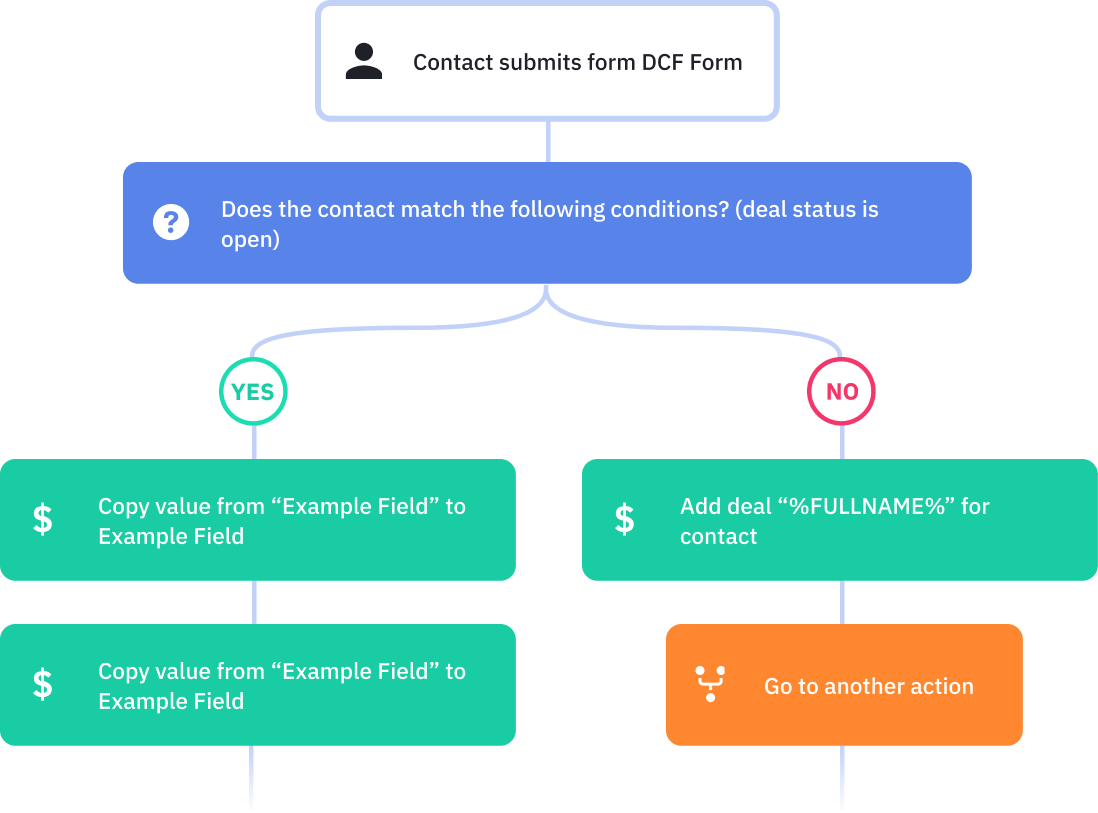
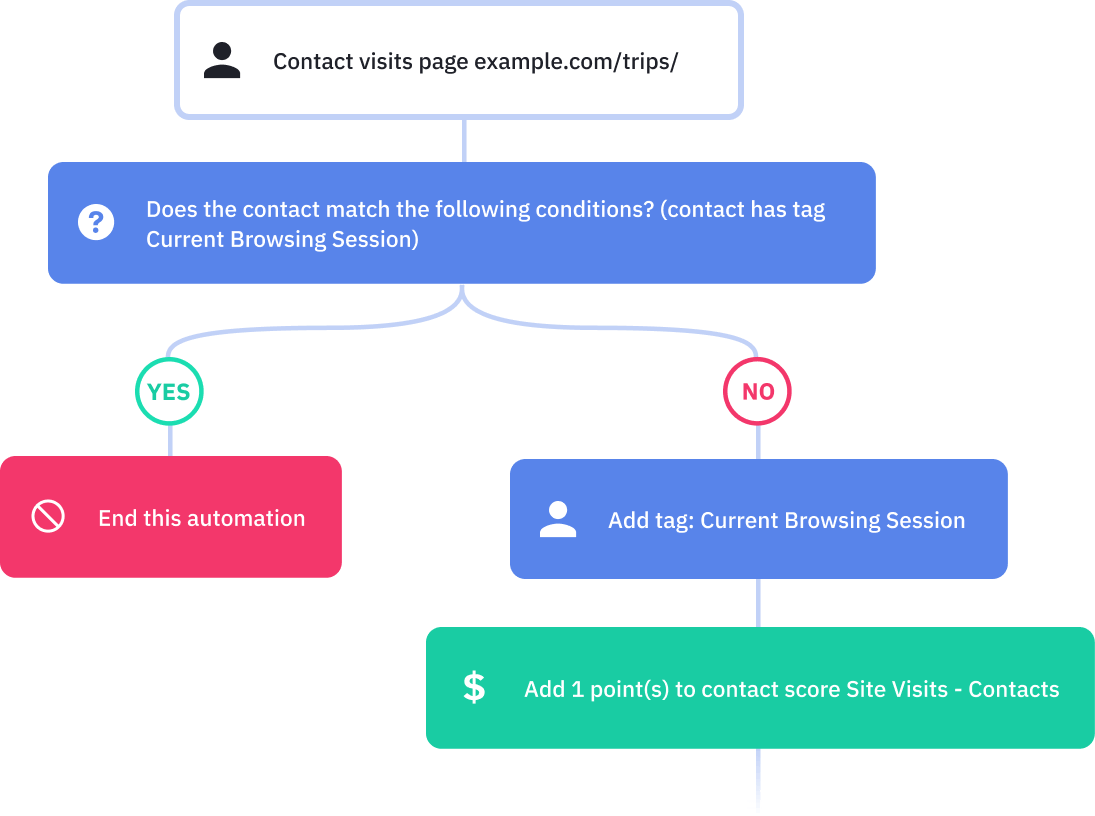
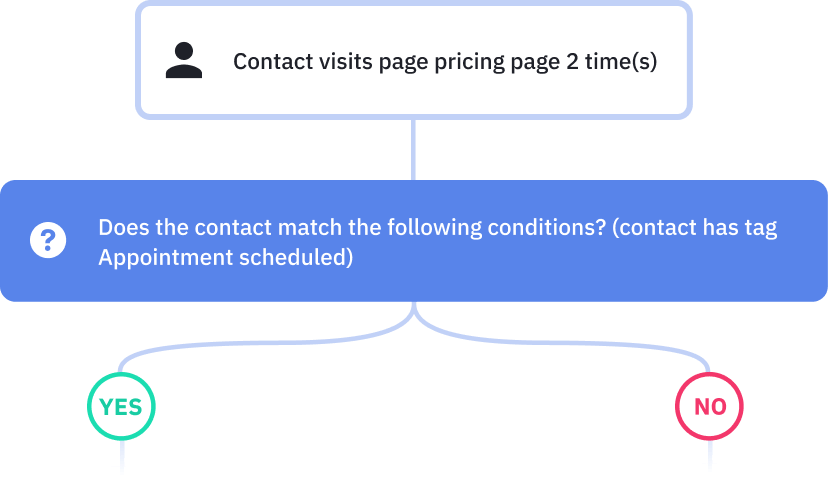
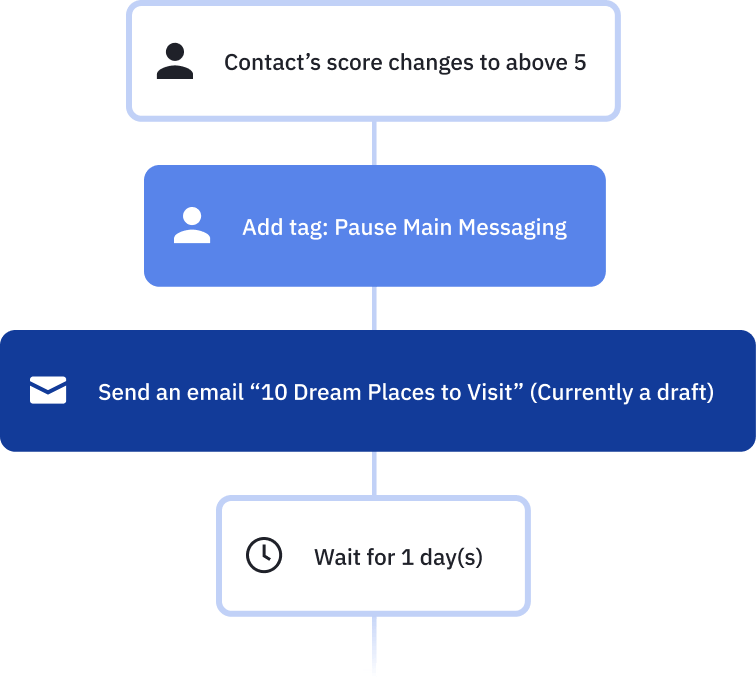
Sales automation: a guide for 2023
Sales automation takes lead prioritization and contact management off your plate, so you can spend your time doing what you do best: closing deals.
But…what exactly can you automate?
Using sales automation with your customer relationship management (CRM) system can help you:
- Keep your team on the same page so nothing slips through the cracks
- Avoid hours of manual data entry
- Shorten your sales cycle so you can sell more in less time
- Stops tasks from piling up for your sales reps (A Nucleus Research study found that marketing automation software increased sales productivity by 14.5%)
- Know which leads to prioritize — and which need to warm up with an automated nurture campaign
- Close more deals (4 in 5 users increased their leads using marketing automation software, and 70% saw an increase in conversions)
In this guide, we’ll cover seven parts of your sales process that you can automate — plus 21 automation recipes you can import and use right away.
- Track and manage all of your contacts in one place
- Find your most qualified leads with lead scoring
- Create and update deals automatically
- Nurture leads throughout the sales funnel
- Assign tasks and leads to your sales team
- Integrate sales automation into a CRM
- Choose the best sales automation software for your business
1. Track and manage all of your contacts in one place
When you can see your whole sales process at a glance, your sales team is always on the same page. Automation lets you track every interaction and pick up where your teammates left off. A sales automation CRM keeps your entire sales process moving smoothly.
Process automation also means that your sales processes will unfold the same way every time. No rogue sales reps, no missed steps, no customer service issues falling through the cracks.
If you automate your CRM, you can see exactly where your contacts:
- Engage with your marketing campaigns
- Connect in the sales cycle
- Show interest in certain products or services
- Convert into customers
- Need support and additional service
Use automation to segment your leads
Segmentation (grouping contacts based on what they have in common) is one of the key ingredients in marketing and sales automation.
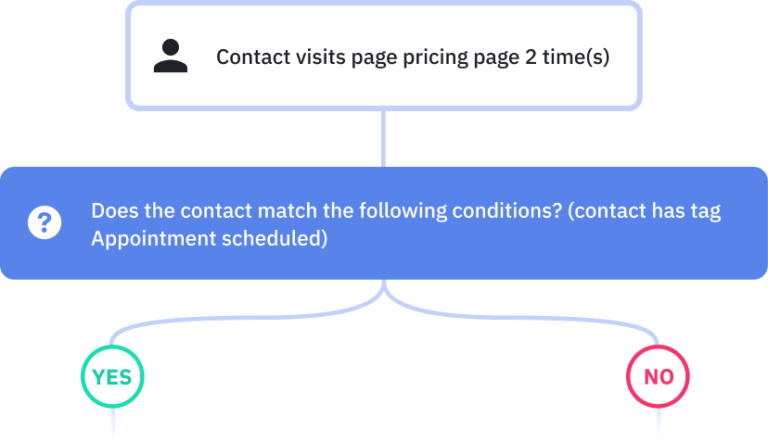
When you segment your leads, you can learn more about what they want from your business — then highlight and promote exactly what they want to see. Segmentation lets you provide a more personalized sales experience, even when you use automation to reach out to new leads.
You can segment your leads based on almost anything you can imagine, including:
- Visits to your website
- Contact with your sales team
- Information in custom fields
- Industry
- Job function
- Organization type
- Date subscribed
- Geographic location
- Content viewed
- Products purchased
- Time since last purchase
You can segment your contacts with lists, tags, and custom fields.
Lists are a broad form of segmentation and usually indicate a contact’s status: active, open vs. closed deal, customer vs. non-customer, etc.
A tag indicates contact attributes that are time-sensitive or subject to change; things like having downloaded a certain lead magnet, attended an event, or signed up for a demo.
Custom fields are the most targeted and personalized level of segmentation. A custom field is a specific data point within a contact’s profile. Examples of custom fields are Twitter handle, birthday, type of pet, business size… pretty much any data point you want to collect about a lead can be stored in a custom field.
Here are a few ways you can use segmentation in your sales automations:
- When a contact downloads a lead magnet, automatically tag the lead source so that you can track where your most valuable leads come from
- Send targeted content to different contacts based on a tag. For example, if a contact is tagged as interested in a certain service, enter them into a lead nurture flow focused on that service.
- Use custom fields to fill in contact details in your emails, like business location or industry. This lets you personalize your sales emails while still automating your outreach.
- When a contact repeatedly views your pricing page, automatically invite them to book a sales call with your team
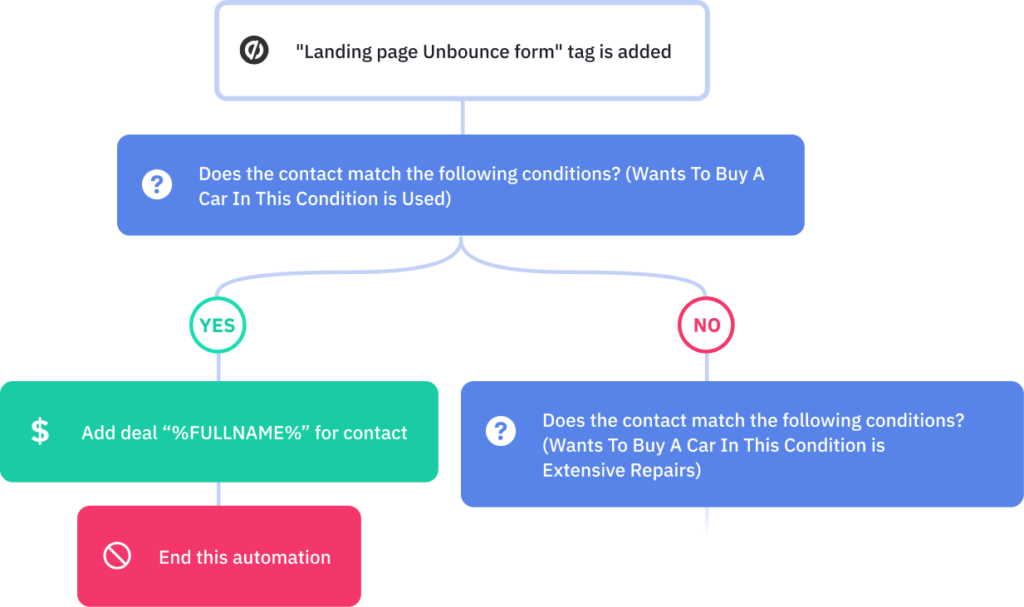
2. Find your most qualified leads with lead scoring
Some people are almost ready to buy from you — and some are in danger of not becoming customers at all. How can you tell who is who?
Lead scoring lets you measure how engaged and qualified each lead is — without manually counting how many times they’ve answered your calls or replied to your emails. With automation, you can update scores based on calls, email engagement, and site activity, so you always know which leads are ready to talk to your team.
Lead scoring helps you focus on your most qualified leads. A good lead scoring model helps you prioritize leads based on:
- How likely they are to close
- How much they’re likely to spend
- How quickly they’re likely to close
To set up a lead scoring system, you have to figure out what behaviors and characteristics matter. When a lead takes an action, what does that tell you about what they want? Based on those criteria, each lead gets a numerical score.
You can adjust a lead score based on almost any action a lead takes, including:
- Any contact field (including custom fields)
- Email behavior (opens, clicks, forwards, replies, unsubscribes, etc.)
- Website behavior (pages visited, time on page, etc.)
- Form submissions
If you offer more than one product or service, you can set up multiple lead scoring systems, so that you can track interest for each of your offerings individually.
You can use automations to:
- Adjust a contact’s lead score when they take a certain action
- Notify a salesperson and assign them a task when a contact reaches a certain lead score
- Enter a contact into an email series once they reach a certain lead score
…so your sales team can spend time on the leads that matter most.
How to use automations to adjust lead scores
You can set up automations to adjust lead scores when a contact:
- Opens an email
- Visits your pricing page
- Achieves a goal
- Clicks a link in an email
- Purchases a product
- Schedules a meeting
- Replies to your email
- Completes an automation
- Downloads a lead magnet
- Visits a product page
- Abandons a cart
- Registers for a webinar
- Unsubscribes from a list
- Attends an event
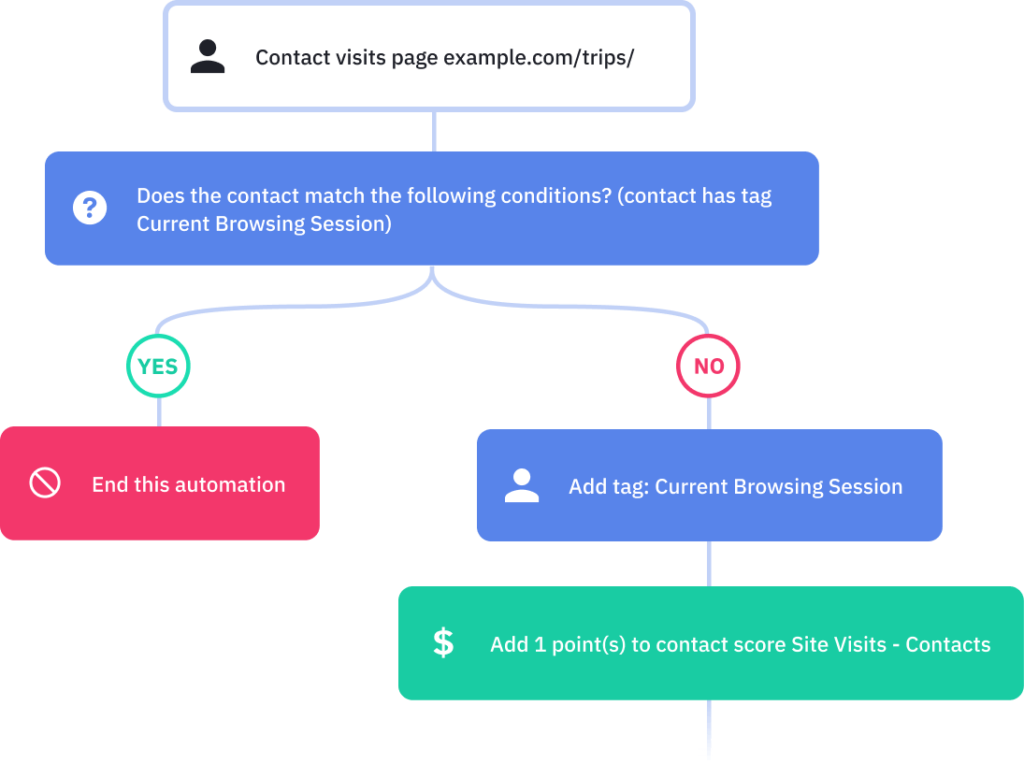
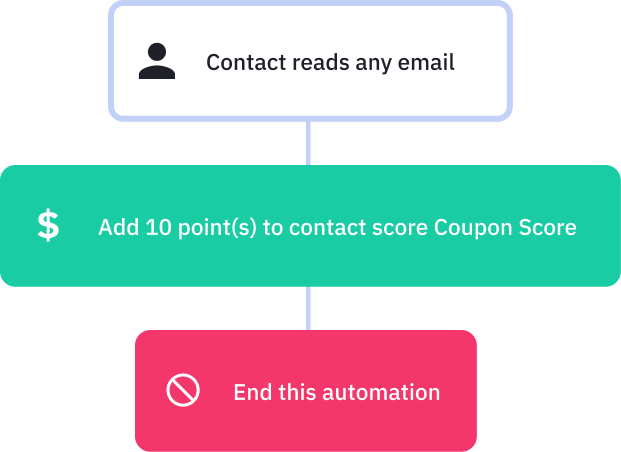
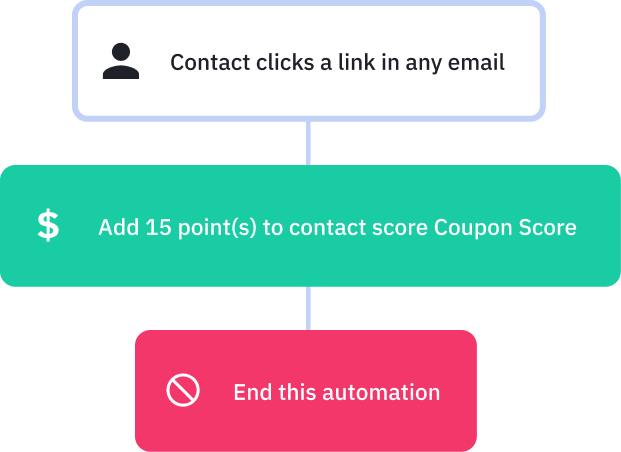
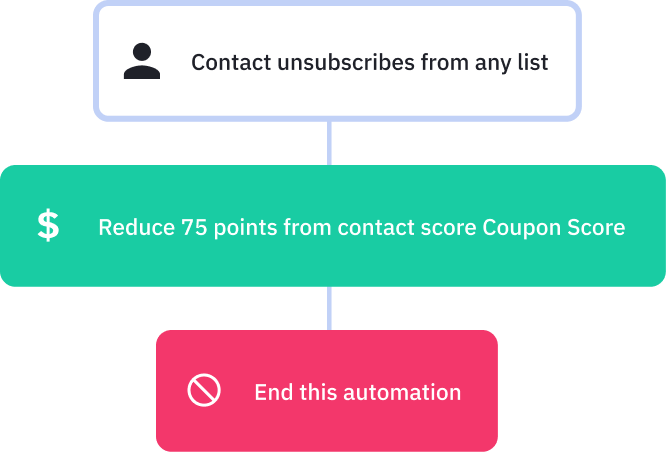
Automated lead scoring in action
Screensharing platform Airtame uses automated lead scoring to make their sales pipeline more efficient. By automating lead nurture, only the most qualified leads reach the sales team.
Airtame tracks two separate lead scores to improve their conversion rate:
- Customer Fit score: How closely does the lead’s profile match Airtame’s ideal customer?
- Engagement score: How often is the lead interacting with Airtame’s emails?
Customer Fit and Engagement lead scores are automatically updated based on activity and contact information. The two lead scores are added together. If the combined score is high enough, the sales team gets tagged in to help.
Airtame updates its lead scores based on:
- Which lead magnet the lead came through
- What information contacts provide
- The lead’s level of website interaction
You can update a lead score based on almost anything you can track in ActiveCampaign. Airtame chose these criteria because they found that certain types of contacts are more likely to become customers.
How to use lead scoring to trigger automations
When a contact hits a certain score, you can automatically:
- Enter them into a targeted email drip series
- Assign a task for your sales team to reach out
- Send them a coupon or other special offer
Send your most engaged contacts the information they need, then make an offer that’s a no-brainer. Lead scoring + marketing automation = a match made in sales automation heaven.
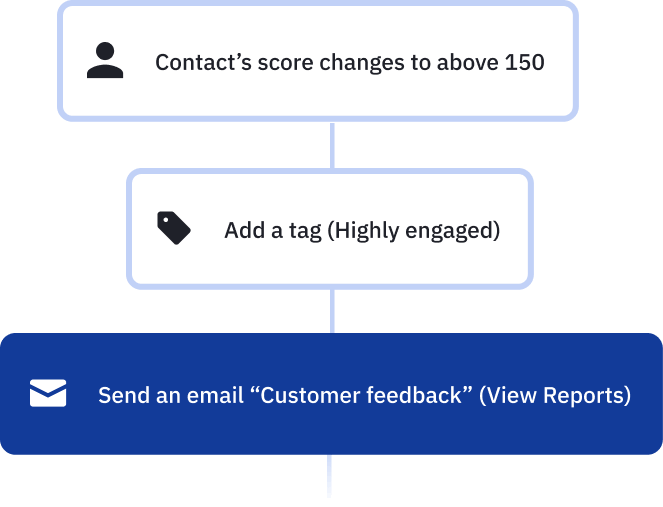

3. Create and update deals automatically
Automating the flow of data into and out of your CRM can save you hours per week.
With sales automation, you can automatically:
- Create a new deal when a lead fills out a form, downloads a lead magnet, or requests a demo
- Update deal owners based on a lead’s actions
- Update a contact’s custom fields
- Move deals to a new stage
- Mark a deal as won or lost
- Update a deal’s value
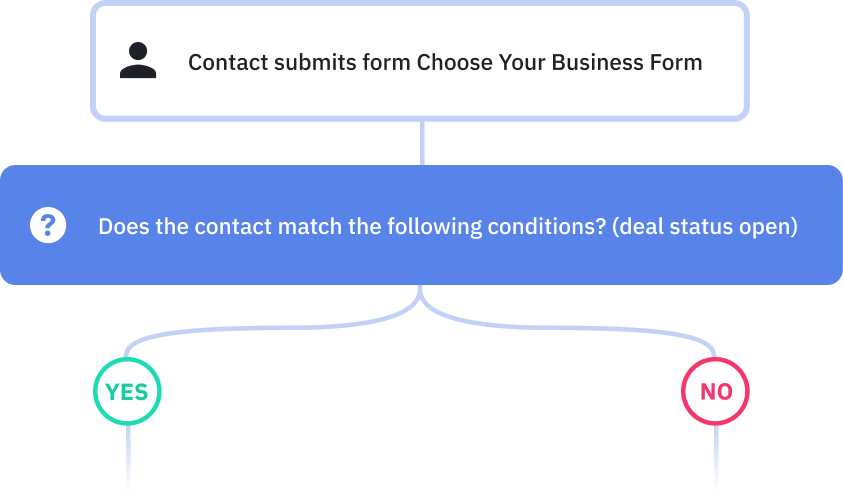
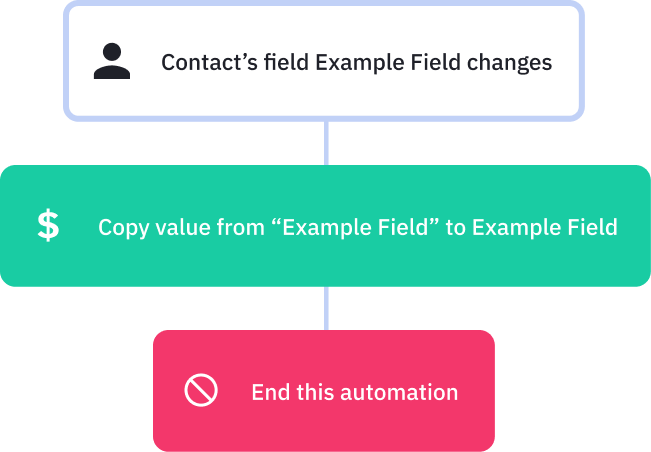
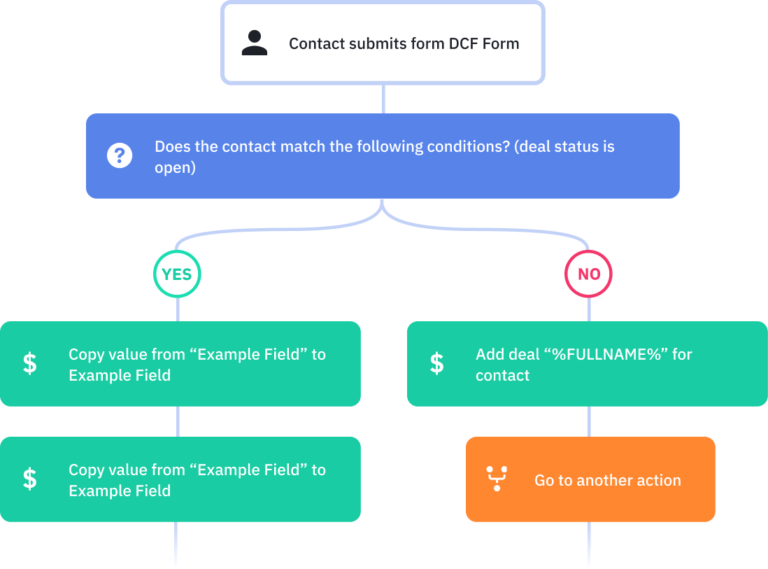
How to use automation to move deals through the sales pipeline
Each pipeline stage is a bucket you place leads in until they move forward in your sales process. When a lead moves to a new stage in the pipeline, there’s probably a notable event that took place — a meeting scheduled, contract signed, demo given, etc.
With sales automation, you can automatically move the deal to the next stage of the pipeline when a significant event takes place. This makes sure that your deals are always exactly where they should be in your CRM — without you manually updating each deal.
Sales automation lets you move deals through pipeline stages:
- When a task is marked as completed, move a deal to the next stage in the pipeline
- When a deal moves to a new pipeline stage, adjust the expected close date
- When a lead schedules a call or fills out a form, update the pipeline stage
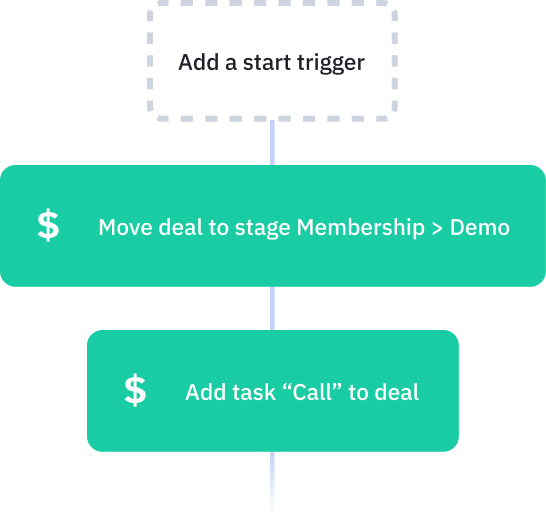
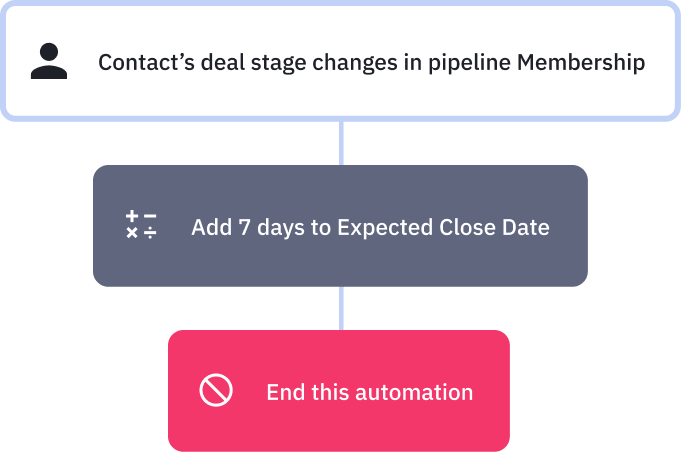
How to use integrations to automate your pipeline
If you have third-party tools that integrate with your CRM and marketing automation platform, you can use those integrations to automatically create deals and move them through pipeline stages:
- Appointment scheduling solutions such as Calendly can move deals when demos, consultations, and calls are scheduled
- Document signing platforms like DocuSign and ApproveMe can move deals when documents are read, signed, and returned
- Payment solutions like Paypal, Stripe, Shopify, and Woocommerce can move deals when payments are made.
- Zapier’s “Update deal” action can help you move deals through stages with events from 700+ apps
Website, scheduling, and ecommerce integrations pull and display valuable information about the customer experience, so you know exactly when a contact:
- Makes a purchase
- Books an appointment
- Submits a form
- Visits a product detail page more than once
- Downloads gated content
- Uses a promo code
- Engages with your website or blog
- Signs up for an event
…and update their contact info or move their deal record accordingly.
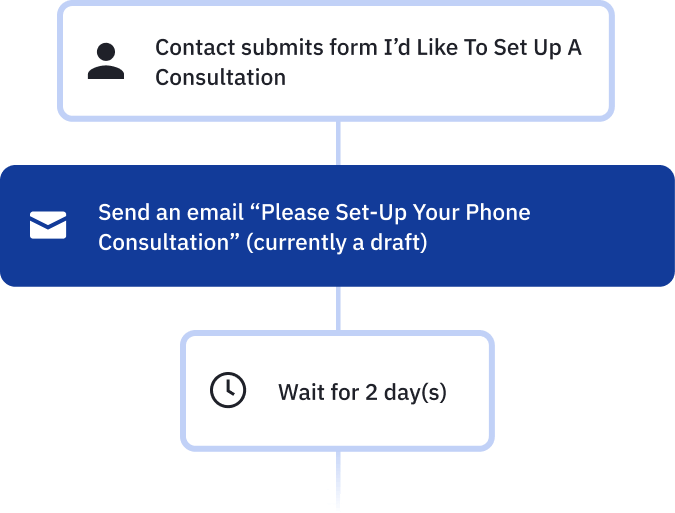
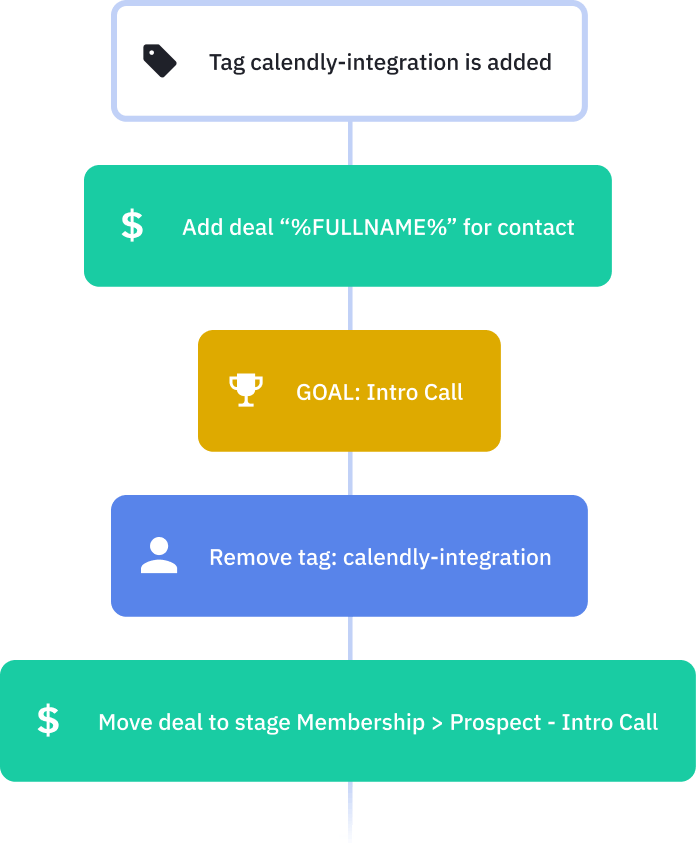
4. Nurture leads throughout the sales funnel
In a perfect world, you would have time to personally reach out to every lead who enters your pipeline.
For most sales teams — especially if you’re trying to scale up quickly — that’s not realistic.
You have to carefully balance the efficiency of automation with the knowledge that your leads probably prefer 1-to-1 communication. One strategy is to reach out personally to a new lead, and if they don’t reply, enter them into an automated lead nurture email series.
As soon as the lead responds, you can automatically remove them from the automated sequence and get them in touch with a salesperson (a massive reduction in response time) for a more personalized experience. This lets your sales team focus on engaged leads and rely on automation to warm up cold leads until they’re sales-ready.
Building lead nurture campaigns for through your marketing automation platform helps you:
- Warm up cold leads
- Shorten the sales cycle
- Share different information depending on how familiar they are with your brand
- Customize the content based on what they’ve clicked, downloaded, or shared
- Create a personalized experience throughout the sales funnel
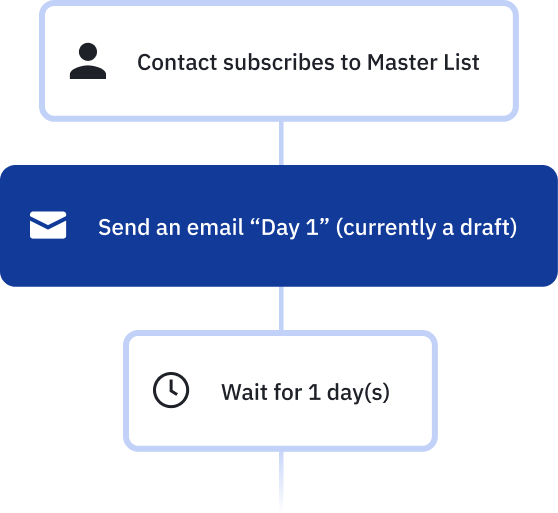
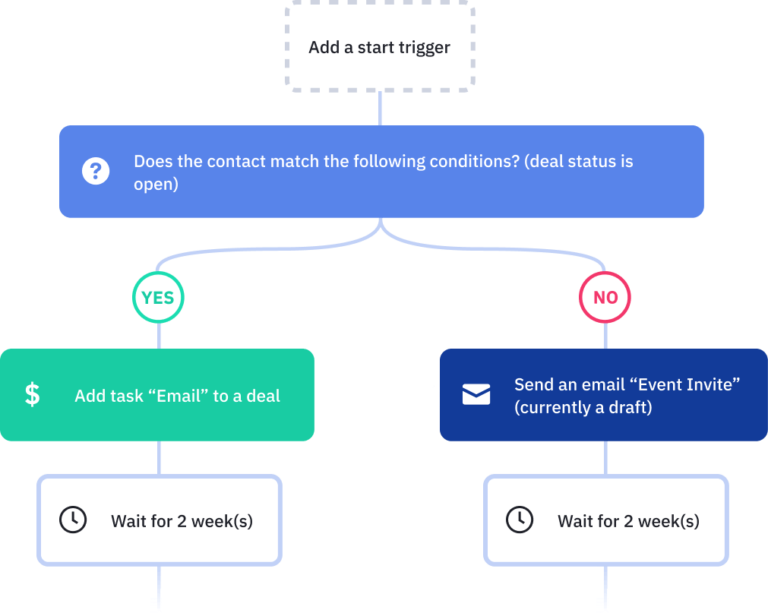
You can automate the customer experience beyond lead nurture, too.
When a deal is marked as “Won,” begin the customer onboarding process by automatically:
- Entering the contact into an onboarding email series
- Notifying your onboarding team and assigning a task to set up an onboarding call
- Sending webhooks to other apps
Automation can also help you bring back lost deals. When a deal is marked as “Lost,” automatically enter the contact into a drip series of win-back emails to keep your company top-of-mind if the lead needs your services in the future.
5. Assign tasks and leads to your sales team
Automation can help keep your sales team organized and aligned, so they can focus on doing what they do best: Closing deals.
With automation, you can:
- Notify a sales rep when their lead takes action. If a lead browses specific pages or puts in a pricing request, send an automatic notification so that your salesperson can follow up directly.
- Let salespeople know which leads are heating up. Automatically trigger email notifications and assign tasks based on lead score changes, so you can always follow up with the deals most likely to close.
- Distribute new leads across your sales team — no round-robin spreadsheet or random number generator required
- Assign tasks to individual salespeople, then trigger new automations once a task is marked as completed
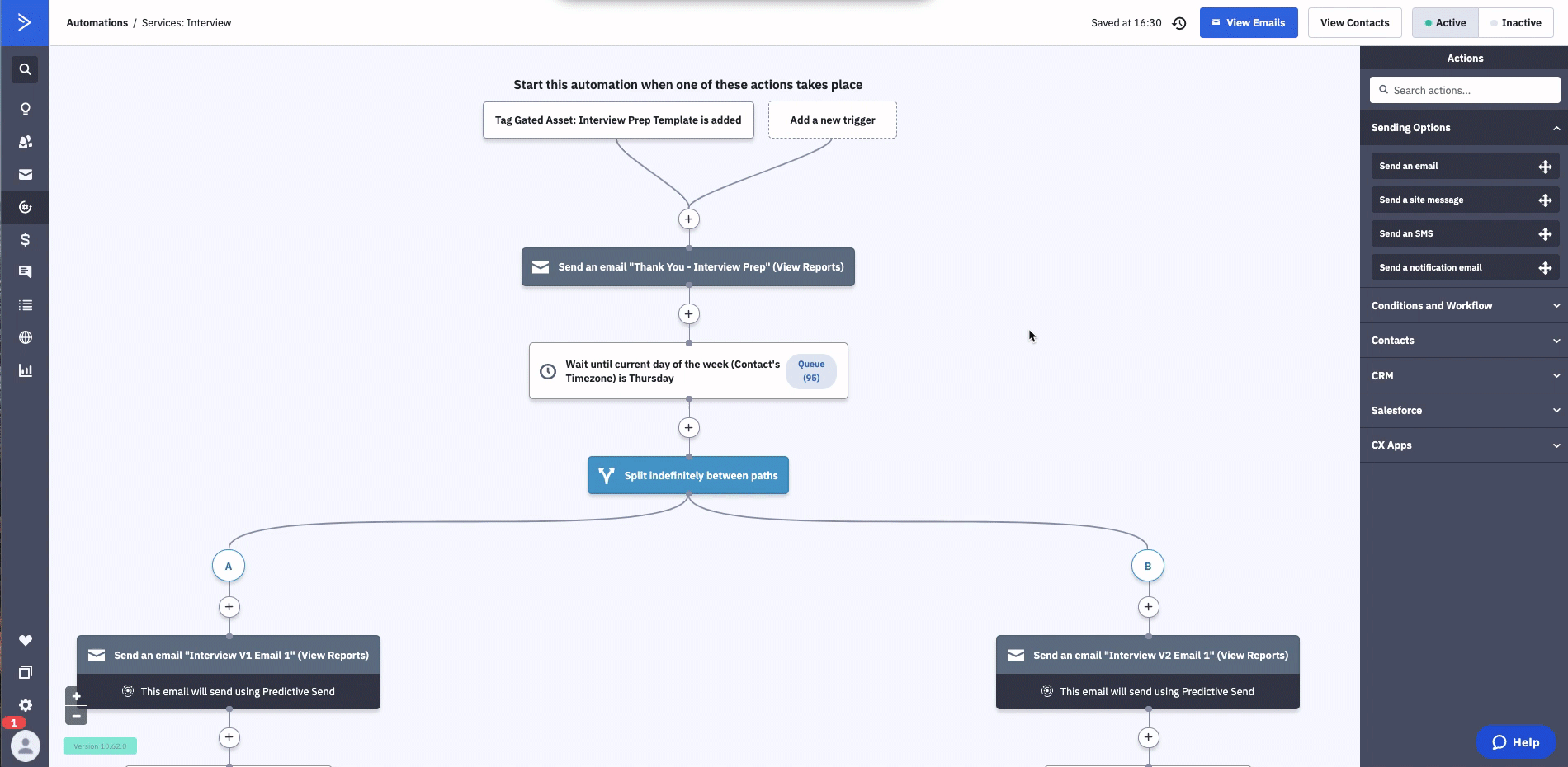
WONSULTING
ActiveCampaign for us has single-handedly been one of the best investments that we've made
How Wonsulting automated manual processes to take a strategic look at what else they can do for their customers.
30%
revenue from a single automation
+25,000
signups in the first month
Try sales automation for free.
Try ActiveCampaign’s sales automation platform free. No credit card required. Instant set-up.
How to use automations to assign tasks to your sales team
Stop sales tasks from getting forgotten or piling up. Use sales automations to assign tasks to your sales team when a contact completes a certain action or reaches a certain lead score. You can also add notifications from within sales automations and nurture campaigns to remind your team to follow up with their leads.
You can automatically assign a task:
- When a lead replies to an email you’ve sent
- When you complete other tasks, so you have perpetual next-actions driving things forward
- When a contact completes a target behavior (Goal)
- When a lead reaches a certain contact score
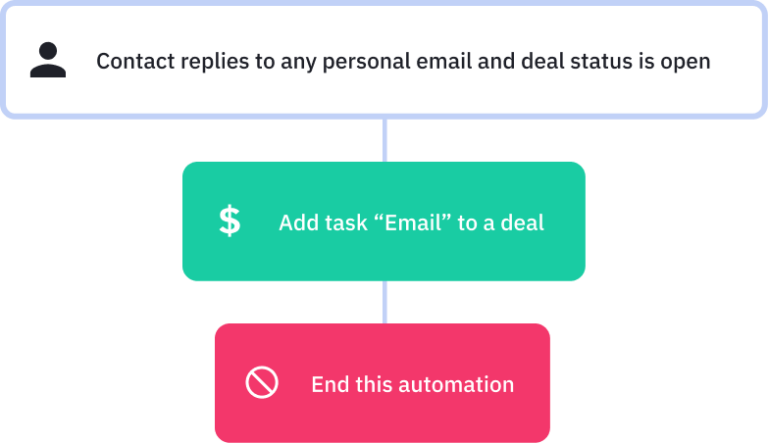
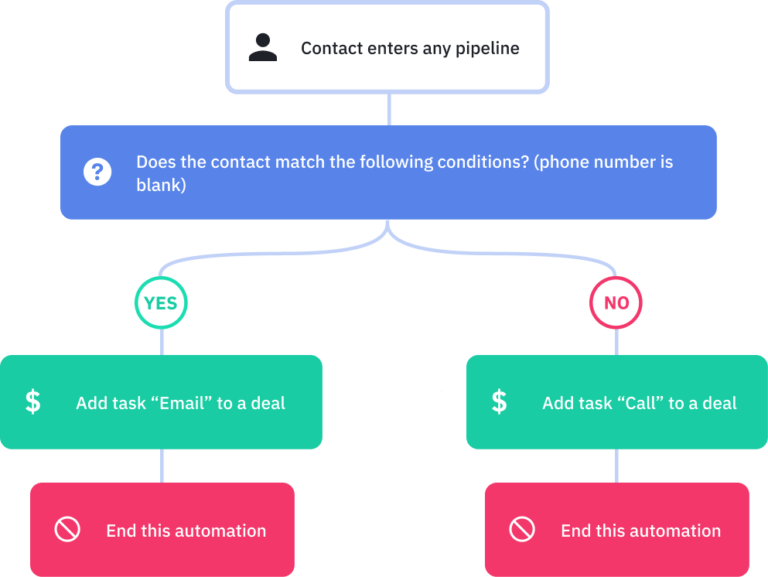
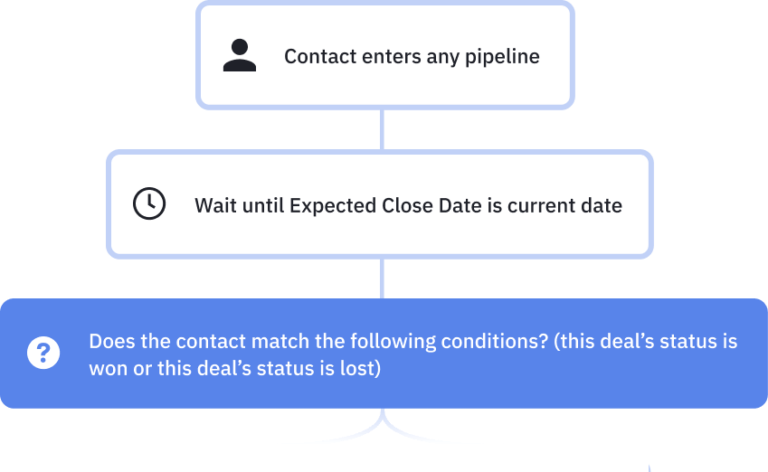
How to use automate lead distribution
You can also use sales automation to automate lead distribution. ActiveCampaign lets you automatically assign leads to different sales team members.
You can distribute leads based on:
- A round-robin format
- Lead score
- Win probability
- Territory
- Deal value
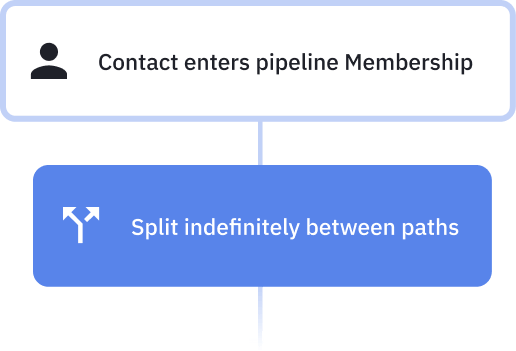
To make the most of automation for your sales team, make sure to connect your marketing automation platform to your CRM.
This keeps your sales team up-to-date on everything your leads have done so far:
- Lead source
- Lead score
- Website activity
- What content they’ve looked at
- Which emails they’ve received
- Segmentation
Having this info on-hand helps balance personalization and automation to provide the best experience to each lead — and close more deals.
Automate your sales processes in a few simple clicks
You don’t need to be a tech wizard to use a sales automation platform. A drag-and-drop automation builder lets you set up automated workflows in minutes. Take the next step with automating segmentation, lead nurture, lead scoring, and update deals automatically.
Segmentation makes sure the right people get the right info
Segmentation lets you send exactly what your contacts want to see. When you automate your segments, you can deliver personalized follow-ups with dynamic email content, A/B test flows, and make your sales nurture campaigns more effective.
Try your sales automation platform for free today
Try ActiveCampaign’s sales automation platform free. No credit card required. Instant set-up.
See your entire customer lifecycle in the automations map
See all your automations in a single view. With a birds-eye view of your sales automation platform, you can check performance reports quickly, then make tweaks without worrying about stuff going wrong. Your whole sales process is connected across every channel.
The most important tool you’ll ever need!
“With AC you are saving more than money but time with your business. I have been able to close deals, get new clients, upsell to existing clients – all this, 24 hours a day, regardless if I’m at my desk or on the road.”
— Mark H., 5-star, G2 Crowd Review
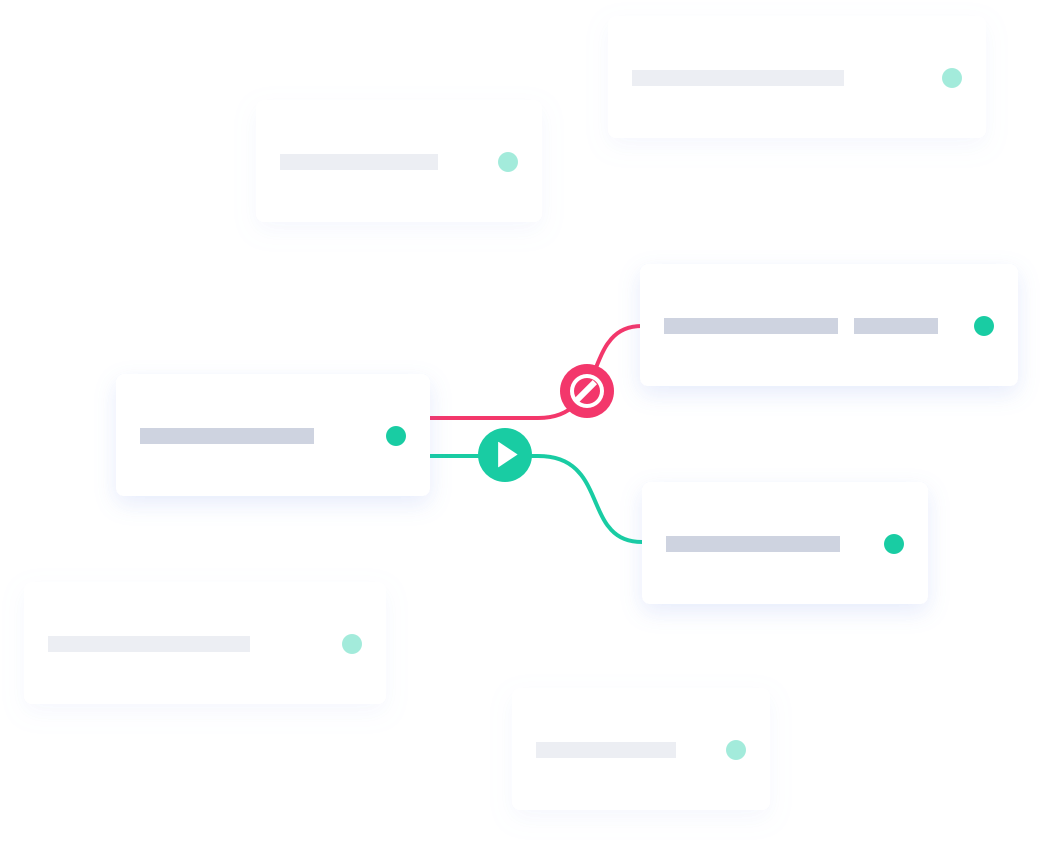
Whenever you need support or
training, it's here for you
— Stephen Ezell, CEO, MyGreenFills
Save time and grow your business.
Try ActiveCampaign’s sales automation platform free. No credit card required. Instant set-up.
— Deji DJ S., 5-star G2 Crowd review
Do you run a business that sells any kind of product or service to any level of customer (whether business or consumer)? Any business with a sales, marketing, or billing team can use a CRM.
A CRM tool can help you better understand your customer needs and optimize your sales, marketing, and customer support efforts. It can help you streamline your efforts and deliver a unified customer experience across channels.
Just 24% of businesses say they are successfully doing omnichannel personalization, with silos and infrastructure as key barriers.
A CRM can help you bridge that gap.
How does sales process automation work?
Sales process automation is the use of software to automate sales tasks. By automating sales tasks, businesses can improve efficiency and close more sales. In addition, sales automation can help to nurture leads and keep customers engaged.
Sales automation software typically includes several features, such as:
Customer relationship management (CRM)
A CRM system helps sales reps keep track of customer interactions and sales data. This information can be used to understand customer needs better and close more sales.
Lead generation
Automated lead generation tools can help sales reps identify potential customers and gather contact information.
Reporting and analytics
Automated sales reporting and analytics can help sales reps track sales performance and identify areas for improvement.
Appointment scheduling
Appointment scheduling software can help sales reps book sales appointments with potential customers saving time and improving sales efficiency.
Email marketing
Automated email marketing tools can help sales reps send sales pitches and promotional materials to potential customers. This can help to generate leads and close sales.
The benefits of sales automation for small business
If you’re like most small business owners, you wear a lot of hats. You’re the salesperson, the accountant, the customer service representative, and more. It can be tough to keep up with everything, but fortunately, some tools can help. One of them is sales automation.
Sales automation is a tool that can help you keep track of your sales goals and progress. It can also help you automate repetitive tasks, such as sending follow-up emails or scheduling appointments. Best of all, it can help you free up your time to focus on other aspects of your business.
For small businesses, sales automation can provide many benefits.
Increase sales
Online sales automation is a process whereby businesses can automate the tasks involved in selling online. This can include things like setting up payments, creating and managing customer accounts, and sending out confirmation emails. By automating these processes, businesses can free up time and resources allocated elsewhere for maximum productivity.
In addition, online sales automation can help to improve customer satisfaction by ensuring that orders are processed quickly and accurately. Perhaps most importantly, though, online sales automation can help to increase sales by making it easier for businesses to reach and convert potential customers.
By automating the tasks involved in selling online, companies can give themselves a valuable competitive advantage.
Reduce costs
For any small business, reducing costs is always a top priority. One way to do this is to automate as many processes as possible. This is where online sales automation can be a big help. Businesses can save valuable time and money by automating tasks like email marketing, social media campaigns, and even customer service.
In addition, automation can also help to improve customer satisfaction by ensuring that inquiries are always answered promptly and that orders are processed quickly and efficiently. As a result, online sales automation is an essential tool for any small business looking to reduce costs and improve its bottom line.
Improve customer service
In today’s world, excellent customer service is more important than ever. With the rise of online shopping, customers expect a high level of service and personalized attention. However, small businesses often struggle to provide this level of service due to limited resources.
Online sales automation can help level the playing field by providing small businesses with the tools they need to deliver outstanding customer service. By automating key processes, companies can free up time and resources that can be redirected toward providing a better customer experience.
In addition, online sales automation can help businesses keep track of customer data and preferences, making it easier to provide a tailored experience. As a result, online sales automation can be a powerful tool for small businesses looking to improve their customer service.
By automating sales processes, businesses can free up time for their sales staff to focus on other tasks. Automation can also help enterprises keep track of customer orders and payments and send automatic reminders when payments are due. In addition, sales automation can help businesses manage their inventory levels, ensuring that they always have the products they need in stock.
Integrating sales automation into a CRM
Any sales team or sales manager can benefit from sales automation, which uses technology to automate repetitive sales tasks. By integrating sales automation into a CRM system, sales teams can make their workflows even more efficient. Sales automation can be used for the following purposes.
Track leads and prospects
CRM, or customer relationship management, the software is essential for any business that wants to remain organized and efficient. CRM software provides a central database for storing customer information, tracking leads and prospects, and managing the sales pipeline.
It can be accessed from anywhere, at any time, making it a valuable tool for sales teams that are constantly on the go. In addition, CRM software can be customized to fit the specific needs of any business. As a result, it is an invaluable tool for businesses of all sizes.
Send automatic follow-up emails
You’re missing out on significant sales opportunities if you’re not automatically sending follow-up emails after contacting potential customers. Using a CRM system to automate your follow-up emails lets you stay top of mind with your leads without putting in the extra effort.
The best part is that once you set up your automated follow-up email system, it will continue working for you even when you’re on vacation or taking a break from work. So if you’re ready to close more deals and boost your sales, start using a CRM to send follow-up emails today automatically.
Schedule sales appointments
Businesses today are always looking for ways to cut costs and increase efficiency. One way to do both is to use a CRM, or customer relationship management, system. A CRM system can automate and keep track of various manual tasks and administrative tasks related to sales, including scheduling sales appointments.
By using a CRM system to schedule sales appointments, businesses can save time and money while improving customer service. In addition, a CRM system can help companies keep track of customer interactions and preferences, making it easier to provide tailored service.
As a result, using a CRM system to schedule sales appointments is an effective way to improve efficiency and customer service. In addition, sales automation can be used to generate custom reports and analytics, giving sales managers a clear picture of their team’s performance. When used correctly, sales automation can be a powerful tool for sales leaders to boost productivity and increase sales.
How to choose the best sales automation software
There are a lot of sales automation software programs on the market these days. So, how do you choose the best one for your business?
Here are a few things to keep in mind when selecting a solution:
- First, consider your specific needs. What features does your sales team require? Make sure the software you choose has those features.
- Second, take a look at the user interface. Is it easy to use? Can your sales team navigate it quickly and easily? If not, keep looking.
- Third, think about integration. Can the sales automation software you’re considering integrate with your other business applications? This is important for efficiency and productivity.
- Fourth, the size of your sales team. If you have a large sales team, you’ll need a sales automation tool to handle a high volume of data.
- Fifth, you’ll want to consider your sales process. Every sales team is different, and you’ll need a sales automation tool that fits your unique operations.
- Finally, don’t forget about the price. There are a lot of great sales automation software programs.
Jump into sales automation
Eager to get started? Check out this video where we walk you through how to get started with sales automation in your CRM, how to determine what to automate first, which tasks make the most sense to automate, and which have the biggest impact.
What can you get in a sales automation platform?
ActiveCampaign lets you connect every channel you use in your business. Pull in data from email marketing, social media, digital advertising, and your website, then use automation to segment your contacts, personalize your messages, schedule marketing campaigns, update pipeline and create stronger customer experiences.
Site tracking
What do people do on your website? Connect your CMS tool to track actions on your site, then follow up with triggered messages.
Sign-up forms
Collect email addresses, segment your audience, and trigger automations with custom forms and landing pages.
Migration services
We’ll migrate your automations, email templates, sign-up forms, and contacts to ActiveCampaign for free.
Goal tracking
Track goal analytics and conversions to see what’s working and what isn’t in your marketing.
Advanced reporting
Figure out which marketing campaign automation gets results. Use performance and custom reports to find ways to grow.
Attribution
Track the entire customer lifecycle to see where your customers come from.
Split action
Find your top performing automations by A/B testing your automations and email funnels against each other.
Lead scoring
Find your most engaged contacts and nurture leads to offer them exactly what they want.
Notification emails
Let automation nurture your leads, then notify you and automate task assignment at the perfect moment to follow up.
Is sales automation right for you?
Sales automation is an invaluable tool for businesses of all sizes.
By using sales automation software, companies can benefit immensely. When used correctly, sales automation can be a powerful tool for boosting productivity and increasing sales.
While sales automation software can be a helpful tool for salespeople, there are additional considerations.
One of the most significant things to consider is that sales automation software can lose personal touch in the sales process. When salespeople rely too heavily on automation, they may lose sight of the essential human element for successful sales.
It is essential that your sales reps (including SDRs and BDRs) use sales automation to scale human interaction, not substitute it.
Let's put sales automation to work for you...
Make every single lead feel like they have a personal marketer at your company. Get a free 14-day trial of ActiveCampaign.